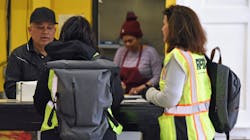RIPTA’s R-Line Fare-Free Pilot Program helping to increase ridership
The Rhode Island Public Transit Authority (RIPTA) has seen ridership increase during the past six months following the launch of its R-Line Fare-Free Pilot Program. From September 2022 through February 2023, ridership on the R-Line was 40 percent higher than the same time period in 2022.
“As RIPTA continues to explore innovative strategies to increase ridership lost during the pandemic, the R-Line pilot program will provide us with important data and feedback from our riders and drivers,” said Scott Avedisian, CEO of RIPTA. “The first half of the program has shown when we invest in our transit system, positive results follow. The popular R-Line service, free-fare pilot and other elements of our Transit Master Plan will contribute to building a world-class transit system that serves all Rhode Islanders.”
The R-Line is RIPTA’s most frequent and highest ridership route. In August 2022, the R-Line carried an average of about 5,400 passenger trips each weekday or 16 percent of RIPTA’s statewide bus ridership. The Fare-Free Pilot Program was introduced by the General Assembly, which allocated $2.5 million for the one-year pilot that began on Sept. 1, 2022. The funds will replace lost R-Line fare revenue and will be used to study the overall costs and benefits of fare-free service to inform future decision-making around fares.
RIPTA has also engaged with riders and employees as part of the study to better understand their experience and insights. RIPTA drivers reported driving is easier, and boarding passengers is faster without having to collect fares. However, there have been reports of increased boarding times, as some customers now see the R-Line as a “hop-on, hop-off” service and try to board buses in-between stops. This type of activity, along with more people riding, may offset time saved by removing fare payment.
In addition, RIPTA has seen revenue impacts. If R-Line riders had been paying the $2 bus fare during the pilot, RIPTA would have earned about $400,000 each month, or the annual equivalent of almost five percent of the entire RIPTA fixed-route bus operating budget. Also contributing to these impacts is an increase in paratransit ridership in the R-Line zone at a rate two times greater than the systemwide rate, or by about 240 more trips per month.
The R-Line Fare-Free Pilot Program will continue through August 2023. During this period, the study team will continue to collect data and will prepare for a second survey on rider travel behavior changes. Surveys will be administered on-board and online over several days this spring, and RIPTA will seek input from community organizations and businesses along the R-Line. Riders will also have the opportunity to provide feedback at pop-up tables at stops along the R-Line.
